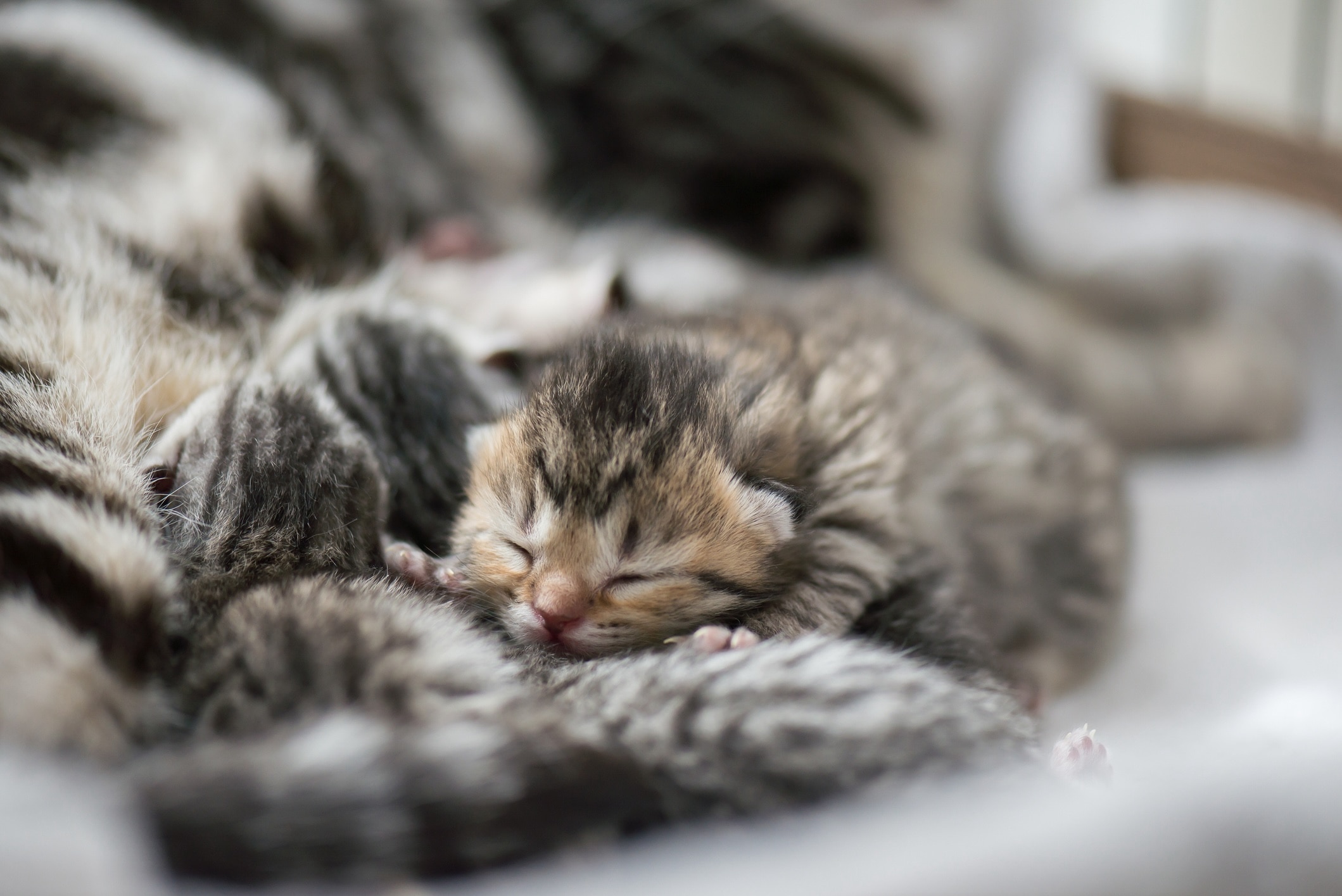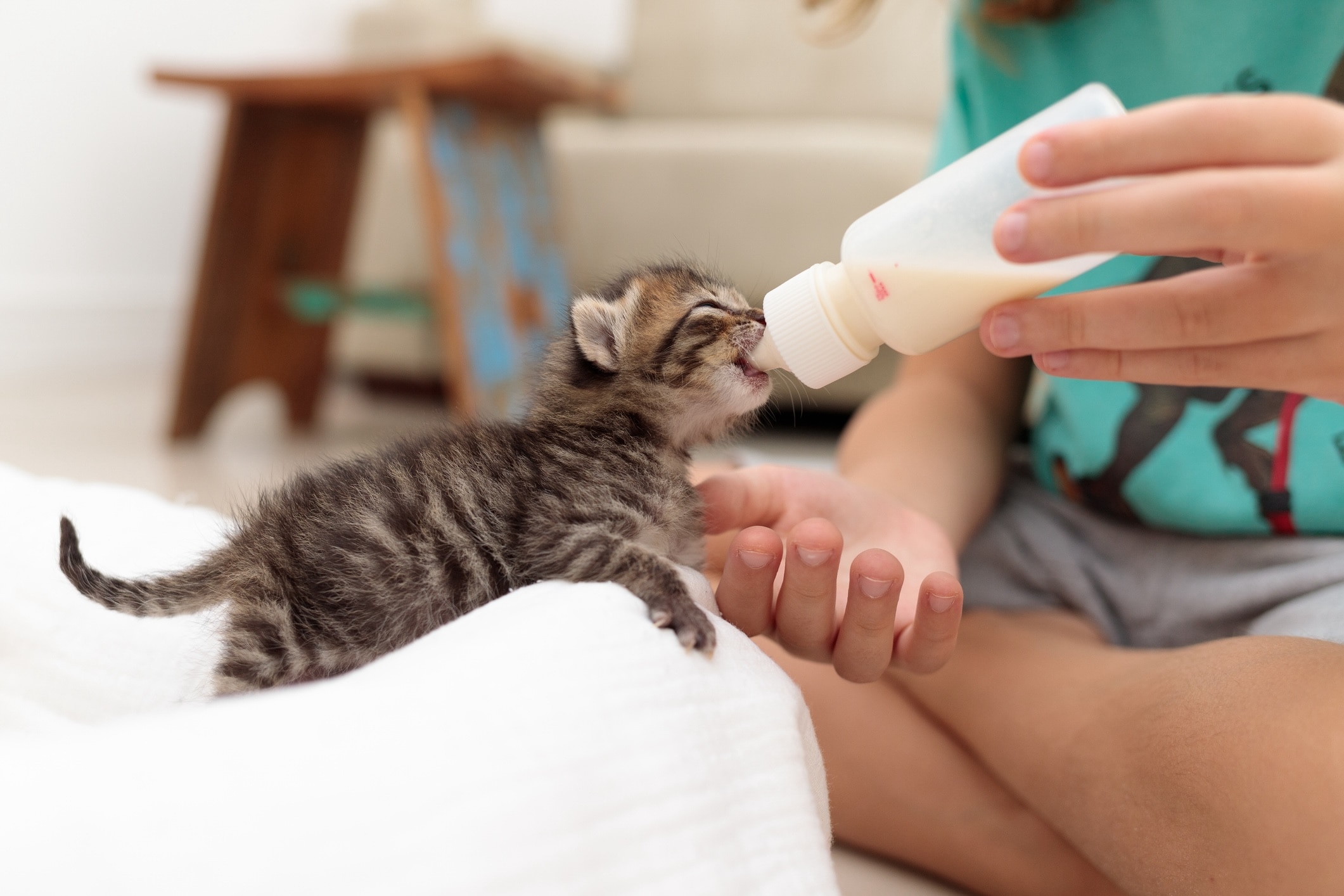Fading Kitten Syndrome
Adobe Stock/vika_hova
Caring for a newborn kitten can be a rewarding experience—but it also can be heartbreaking if they experience fading kitten syndrome. Here’s what to know about the condition and how you can help a kitten survive.
Key Takeaways
- Fading kitten syndrome is when a kitten fails to thrive between birth and weaning.
- The condition can happen for several reasons, including maternal neglect, trauma, birth defects, parasites, and infections.
- Kittens may survive if the underlying cause is identified and treated quickly.
- Take young kittens to a veterinarian immediately if they show any signs of illness.
What Is Fading Kitten Syndrome?
Fading kitten syndrome refers to a kitten’s failure to thrive during the period between birth and when they wean from their mother or a bottle. This period lasts about four to five weeks, when a kitten is most vulnerable to sickness.
Fading kitten syndrome is typically fatal, but recognizing the symptoms can help you understand when to get veterinary help.
Symptoms of Fading Kitten Syndrome
Kittens that fail to meet normal development milestones may be experiencing fading kitten syndrome. Some of these milestones include:
-
The ability to turn over from their back by day three after birth
-
The ability to support themselves on their feet by 2 weeks of age
Other symptoms of fading kitten syndrome include:
-
Constant noises that indicate distress (such as whining or crying), even after feeding
-
Gradually worsening lethargy
-
Lack of appetite
-
Poor suckling reflex/not being able to nurse properly
-
Weakness
-
Inability to gain weight
-
Labored breathing
-
Vomiting
-
Diarrhea
-
Nasal or eye discharge
-
Pale or blue gums
-
Low body temperature
Causes of Fading Kitten Syndrome

Fading kitten syndrome can have several causes. Some include:
-
Trouble during birthing
-
Lack of maternal antibodies (cells that help protect kitten’s immature immune system)
-
Bacterial or viral infections
-
Malformations present at birth (heart defects, gastrointestinal defects, brain defects, lung defects, cleft palate, etc.)
-
Low birth weight
-
Trauma
-
Maternal neglect
-
Malnutrition
-
Environmental factors (unsanitary conditions, inappropriate environmental temperature, etc.)
Genetics can also play a role in fading kitten syndrome. If a mother cat has a blood type that differs from her kitten, her maternal antibodies may attack the kitten’s red blood cells, causing anemia that can lead to fading kitten syndrome. This condition is called neonatal isoerythrolysis.
How Veterinarians Diagnose Fading Kitten Syndrome
To diagnose fading kitten syndrome, your veterinarian will examine your newborn kitten in the first few weeks of life. Your vet will check them routinely every few weeks until the kitten is weaned to determine if they are thriving.
If your vet doesn’t think your kitten is reaching their milestones—such as not suckling correctly (or at all) or not gaining weight—they will recommend diagnostic testing. This testing will help your vet figure out if there is a specific diagnosis for why the kitten is not thriving and is declining in health.
Diagnostic testing typically involves blood work, fecal and urine testing, and imaging (X-rays and/or an ultrasound).
Unfortunately, sometimes a diagnosis can’t be made before a kitten passes away or is humanely euthanized due to poor prognosis or poor quality of life.
If you have other cats or kittens at home, your veterinarian might recommend a necropsy (autopsy). This ensures your other cats are not at risk of developing a contagious disease.
Treating Fading Kitten Syndrome

Fading kitten syndrome may be treatable if an underlying cause can be identified in time, but this is typically not the case. For example, some bacterial infections can be treated if caught early. However, some congenital (present at birth) defects can’t be treated or managed.
Fading kitten syndrome treatment includes supportive care while the veterinarian works to identify an underling cause. Supportive care usually includes:
-
Fluids can be given intravenous (IV) or subcutaneous (under the skin) to keep the kitten hydrated and help regulate other body functions, like correcting low blood pressure.
-
Dextrose is a sugar solution given to support blood sugar levels. Because young kittens still have developing body systems, they often can’t regulate their own blood sugar or have low blood sugar from not eating. Adding this sugar solution to your kittens' fluids or giving it to them by mouth may help them survive.
-
Antimicrobials such as antibiotics or antiviral medications are given to combat specific organisms such as bacteria and some viruses. These medications can be given by mouth. If your kitten is not eating well, most can be given by injection.
-
Nutritional support is provided to your kitten when they are not eating well on their own. Typically, a feeding tube is placed either in your kitten's nose or directly into the stomach to provide them with the calories, vitamins, and minerals they need to recover.
-
Oxygen support is provided to kittens either by placing a nasal cannula directly in the nose or by putting them in a special oxygen cage. Oxygen helps kittens that are having trouble breathing.
-
Body temperature support ensures your tiny kitten can stay warm. Young kittens can’t regulate their body temperature effectively, which can result in a temperature too high (hyperthermia) or too low (hypothermia). Heat support can be provided with an incubator or warmed bottles placed around the kitten. Cold compresses can be used along with ice on the paw pads to help a high temperature come down.
A delay in evaluation and treatment could result in:
-
Low body temperature
Unfortunately, even with treatment, some kittens will pass away.
Recovery and Management of Fading Kitten Syndrome
Recovery from fading kitten syndrome is possible if an underlying cause can be identified and treated in time. Unfortunately, fading kitten syndrome is often fatal, with the highest rate of mortality being in the first week of a cat’s life.
If a kitten does survive this crucial period and grows stronger, long-term management involves proper nutrition, providing sanitary conditions and preventative health care, and close monitoring to ensure they gain weight.
The long-term outlook for kittens that recover is good, unless there is a congenital or chronic viral infection that affects the kitten’s life expectancy.
Preventing Fading Kitten Syndrome
Fading kitten syndrome is not often a preventable condition, but it can potentially be prevented by ensuring that your new kitten’s mother cat has adequate prenatal veterinary care.
The mother cat should be fully vaccinated, have flea and tick prevention and undergo routine deworming.
It’s important to ensure your new kitten is taken to the vet within three days of birth to determine if they are healthy. If kittens are displaying signs of illness, take them to the vet immediately.
Fading Kitten Syndrome FAQs
How long do kittens live with fading kitten syndrome?
Kittens with fading kitten syndrome can die suddenly or pass away within a few days. Kittens may survive if the underlying cause is identified and treated quickly.
It’s important to take newborn kittens to a veterinarian immediately if they show any signs of excessive crying, weakness, lethargy, or reluctance to nurse. Unfortunately, fading kitten syndrome is often fatal, with the highest rate of mortality being in the first week of a kitten's life.
What do you feed a kitten with fading kitten syndrome?
A kitten should ideally nurse from their mom, but those with fading kitten syndrome may be too sick. In this case, kittens should be hospitalized and tube fed using a commercial milk replacer.
Is fading kitten syndrome contagious to other kittens?
Depending on the underlying cause of fading kitten syndrome, it may be contagious.
Viruses, bacterial infections, and parasites are often highly contagious. If this is the cause of a kitten’s inability to thrive, it can be spread to other cats and kittens.
Luckily, most viruses are species-specific, meaning your dog is not necessarily at risk of getting sick from your kitten.
How can I tell if a newborn kitten is healthy?
The best way to tell if your newborn kitten is healthy is to have them examined by your veterinarian. It’s recommended that all new pets are examined by their veterinarian within three days of birth or adoption.
Your vet will perform a physical exam and test your kitten for infectious diseases with blood and fecal testing. If you notice your new kitten is showing symptoms of illness or behaving in a way that is abnormal, take them to the vet immediately.
Can a kitten survive fading kitten syndrome?
Yes, if the cause is identified and treatment quickly started, a kitten can survive fading kitten syndrome.
